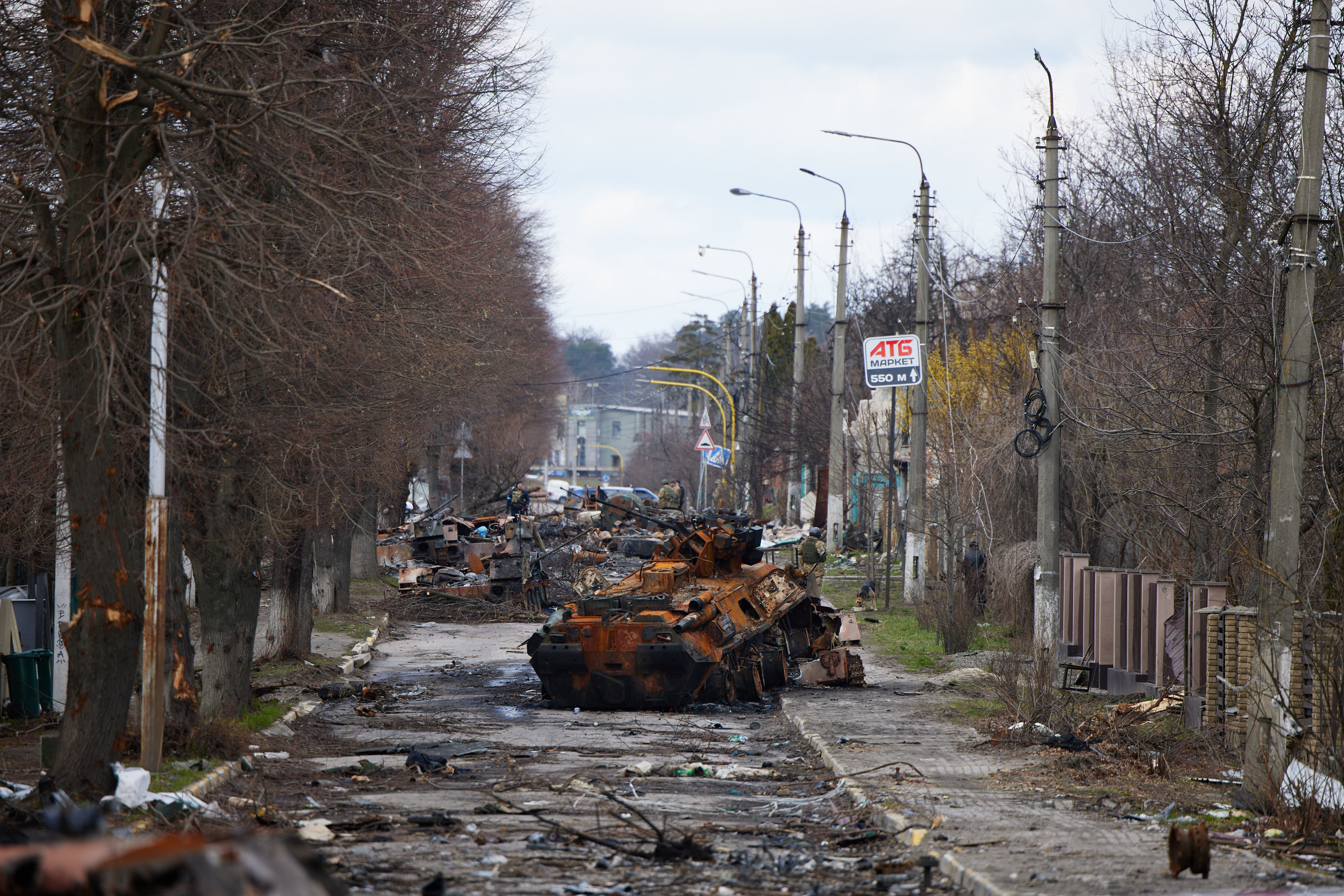The Case for Designating Wagner Group as a Foreign Terrorist Organization Is Still Compelling
Even as the Biden administration has increased sanctions on the Wagner Group, the most effective approach remains a designation as an FTO, as set forth in the HARM Act.

Earlier this year, we argued in Lawfare that the secretary of state should use his authority under the Antiterrorism and Effective Death Penalty Act (AEDPA) to designate Yevgeny Prigozhin’s Wagner Group and its affiliates as a foreign terrorist organization (FTO). Since then, Sen. Roger Wicker (R-Miss.) and Rep. Steve Cohen (D-Tenn.) introduced the Holding Accountable Russian Mercenaries (HARM) Act in the 117th Congress (S.5164 and H.R.9381, respectively). The HARM Act would direct the secretary of state to designate the Wagner Group as an FTO and has bipartisan co-sponsorship. Though the bill did not make it to a floor for a vote before the conclusion of the 117th Congress, it is expected to be reintroduced in the 118th Congress.
On Dec. 2, 2022, the secretary of state also designated the Wagner Group as an entity of particular concern under the International Religious Freedom Act (IRFA) of 1998 for its indiscriminate targeting and murder of members of minority religious groups in the Central African Republic. This was followed on Dec. 21, 2022, by a ruling from the Commerce Department’s Bureau of Industry and Security (BIS), which amended the Export Administration Regulations (EAR) based on BIS’s determination that the Wagner Group is to be considered a Russian or Belarusian “military end user” under § 744.21 of the EAR. This determination restricts the Wagner Group’s access to certain foreign-produced items (primarily but not exclusively weapons and munitions) that use U.S. technology.
While the IRFA designation and the Commerce Department’s actions are important steps, the need for effective tools to suppress the malign activities of the Wagner Group continues to grow. In the wake of Russia’s war crimes in Ukraine, some committed by the Wagner Group, there also have been calls to designate Russia itself as a state sponsor of terrorism (SST). However, an FTO designation, rather than an SST designation, provides greater latitude for the U.S. and is thus the preferable option between the two. We maintain that designating the Wagner Group as an FTO continues to be necessary, and the HARM Act is the right way to achieve that outcome.
Since our original article was published, Prigozhin has given up all pretenses that the Wagner Group is a private company unaffiliated with the Russian state. Over the past several months, Wagner Group forces, with criminals recruited directly from Russia’s prisons, are reportedly fully integrated into Russia’s military operations in Ukraine. Reporting continues to tie Wagner Group members to regular violations of the law of armed conflict and the human rights of innocent civilians worldwide.
Take, for example, the Wagner Group’s release of a horrific video similar to those recorded by the Islamic State. In this video, a Wagner Group deserter, Yevgeny Nuzhin, who was repatriated to Russia as part of a prisoner exchange, was murdered by Wagner Group members using a sledgehammer. Not only did Wagner Group owner Prigozhin not deny the video’s authenticity, but he also went so far as to comment publicly that “Nuzhin was a traitor” and “the dog died a dog’s death.” Beyond Ukraine, the Wagner Group continues to use murder and intimidation in the Central African Republic and other African states to obtain access to gold, diamonds, and other natural resources to circumvent both financial sanctions on Russia and international sanctions against marketing diamonds from conflict zones. Reporting from the New York Times at the end of last year indicated that Wagner Group operatives, working in concert with the Russian Embassy, orchestrated the firing of the head of the Central African Republic’s Supreme Court to ensure that the country’s current president remains in power beyond his two-term limit as a puppet of the Wagner Group. Why the concern about controlling the Central African Republic? As the New York Times describes it, the country is rich in gold and diamonds, as well as timber.
Prigozhin, several of his associates, and the Wagner Group are already subject to U.S. sanctions authorized under the International Emergency Economic Powers Act (IEEPA), which allows the Treasury Department to freeze assets within its reach and to prevent the entry of designated individuals into the United States. These sanctions also allow the U.S. government to block any transactions that are subject to the jurisdiction of the United States and that involve sanctioned individuals and entities (50 U.S.C. § 1702). Sanctions under IEEPA are most effective in discouraging banks with any presence in the United States from engaging in financial transactions with any sanctioned entities. For instance, BNP Paribas pleaded guilty to sanctions violations and was fined $8.9 billion in 2014 for processing financial transactions on behalf of sanctioned entities in the Sudan, Iran, and Cuba.
The December 2022 designation of the Wagner Group as an entity of particular concern under the IRFA highlights its persistent violations of human rights and use of terror worldwide. (On the IRFA, see this primer.) As an entity of particular concern under the IRFA, the Wagner Group joins the ranks of international terrorist groups like the Taliban, Boko Haram, and al-Shabab, and other international terrorist groups designated under this Act. While IRFA designation does publicly condemn the Wagner Group for religious-based human rights violations, such designation does not bring additional sanctions to the Wagner Group.
The Dec. 21, 2022, amendment of the EAR is intended to prevent Wagner Group’s access to any U.S. products, to include products produced overseas using U.S. technology, by expanding U.S. sanctions under the Foreign Direct Product Rule (15 CFR § 734.9). We note, however, that the murders and massacres attributed to Wagner Group mercenaries over the years have been accomplished using Russian-made weapons and equipment and that therefore this action is likely to have limited impact in terms of preventing the Wagner Group’s paramilitary activities. It is not clear how effective the new sanctions will be in limiting the Wagner Group’s expansive mining and logging activities in a number of African countries, which do require commercial equipment, some of which may be subject to the Foreign Direct Product Rule. The expanded Commerce Department sanctions do not extend to non-U.S. products, nor do they cover the vast array of services required for commercial operations. The actions taken under authorities of IEEPA, the IRFA, and the EAR are unlikely to have a serious impact on the Wagner Group’s current ability to operate, especially in Ukraine, Africa, and the Middle East.
It remains our view that the most effective tool against the Wagner Group remains the tool that has been used against other international terrorist groups: a designation of the Wagner Group as an FTO under the AEDPA. The major difference between an FTO designation and existing sanctions is that an FTO designation would bring into effect the U.S. material support to terrorism statutes. The extraterritorial reach of these provisions would make it a crime to provide material support to the Wagner Group and its affiliates.
The Wagner Group relies on an extensive network of companies and foreign government officials to enable its various nefarious activities. Designating the Wagner Group as an FTO would put these individuals and entities on notice that their continued commercial dealings with the Wagner Group in all of its guises will put them at risk of violating the material support to terrorism statutes of the United States. Designation as an FTO will make it legally dangerous to provide support to the Wagner Group as it currently is to provide support to other FTOs, such as the Islamic State, al-Qaeda, Hezbollah, and Hamas.
The HARM Act was proposed based on a legislative finding that the Wagner Group meets the statutory definition of a foreign terrorist organization and that the activities of the Wagner Group and its affiliates pose a threat to the national interests and national security of the United States, its allies, and partners. The HARM Act details specific activities of the Wagner Group and its affiliates that demonstrate that the Wagner Group engages in premeditated, politically motivated violence perpetrated against noncombatant targets. The HARM Act also demonstrates bipartisan congressional support for designating the Wagner Group as an FTO. Since clear statutory authority already exists to allow the secretary of state to designate the Wagner Group as an FTO, it is not necessary for the Biden administration to wait for this legislation before taking action. The secretary of state could achieve the goal of the HARM Act in short order by designating the Wagner Group under the existing authority of the AEDPA.
We continue to believe that the designation of the Wagner Group as an FTO, which will enable use of the material support to terrorism authorities of the AEDPA, will be the most effective tool to combat the Wagner Group’s activities. Sanctions to date under other authorities are important but appear to have had limited impact in hindering Wagner Group’s operations either in Ukraine or in Africa. FTO designation and the use of the material support to terrorism statutes can severely hamper its ability to maintain its business ties with nation-states in Africa and elsewhere, conduct financial transfers, provide corrupting financial support to certain African leaders, and obtain logistical support for its overseas operations. This would be a significant step forward in severely limiting one of Russia’s most malicious instruments in its foreign policy toolbox. If it is unable to attract new clients, maintain its current ones, or recruit new personnel (beyond jailhouse recruitments), the Wagner Group’s viability as a private military company supporting the Kremlin’s foreign policy and financial gain will be seriously degraded.
Designating the Wagner Group as an FTO also strikes at a powerful Kremlin resource without endangering other equities in U.S.-Russia bilateral relations, especially important diplomatic lines of communication. Over the past several months, a number of people have argued that Russia itself, and not just the Wagner Group, should be designated as an SST—a designation currently applied to Syria, Iran, Cuba, and North Korea. As Jocelyn Trainer argues in a Nov. 29, 2022, Lawfare article, it is not clear what advantage would accrue to the United States by this designation, beyond making it more difficult to maintain lines of communication with the government of Russia necessary to ensure the two countries do not inadvertently stumble into a direct conflict. Diplomatic and military-to-military channels are essential to help avoid U.S.-Russia conflict and clearly communicate to Moscow the consequences it faces if, for instance, it uses nuclear weapons in Ukraine. Similar channels in Syria must also be maintained to prevent inadvertent conflict between Russian and U.S. armed forces conducting combat operations in close proximity to each other. Designating Russia as an SST is likely to lead to a break in diplomatic relations, which would hamper, if not destroy, those lines of communication. Unlike naming Russia as a state sponsor of terrorism, designation of the Wagner Group and its affiliates as an FTO would have real-world consequences but with far less risk to bilateral relations than designating Russia as an SST. This designation could be revisited if Russia ever uses a nuclear weapon against the non-nuclear state of Ukraine. In the meantime, the best approach to ending Russia’s use of terrorism as a tool of its predatory statecraft is to concentrate effective U.S. government sanctions against the Wagner Group to deprive it of the resources it needs to operate.




